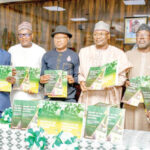An Abuja Area Court in Karmo has referred to the police for investigation an allegation of certificate forgery leveled against Ahmed Ndakene, a federal lawmaker from Kwara State.
Ndakene, a lawmaker representing Edu/Moro/Patigi Federal Constituency of Kwara State on the platform of All Progressives Congress (APC), appeared before the court over alleged criminal breach of Section 88(1), 89(3) and 109c of the Administrative Criminal Justice Act (ACJA) 2015 brought against him by Mahmud Babako.
- Appeal Court sacks Kwara APC lawmaker
- Kwara lawmaker faces certificate forgery charge, gets N5m bail
Babako, a candidate of the Peoples Democratic Party (PDP) in the election that produced Ndakene, alleged that the defendant forged the certificate he presented to the Independent National Electoral Commission (INEC) in the form he used to contest for the 2019 election.
At the resumed hearing, the judge, Inuwa Maiwada, asked Ndakene if he understood the complaint against him and if he was in receipt of the same.
Ndakena answered in the affirmative to both questions.
However, when he was asked if he was in agreement with the complaint, he disagreed.
The judge, thereafter, held that the allegation of forgery in the complaint was weighty and therefore referred the matter to the Utako Divisional Police Headquarters for investigation.
Maiwada in addition ordered that the report of the investigation be submitted within two weeks and adjourned the matter until July 1, for ruling on the investigation report.
He, thereafter, cautioned parties from making damaging utterances and advised that only their counsel, who had clear understanding of legal terms, should address the media.
Earlier, the judge ruled on the issue of whether or not a private legal practitioner has the power to prosecute a criminal matter or not as was argued by the parties at the last sitting.
Maiwada, in his ruling, held that the argument canvassed was whether or not a private prosecutor can prosecute was in the affirmative in compliance with Section 383 of the Administrative Criminal Justice Act ( ACJA), 2015.
According to Maiwada, the section clearly stated some conditions were to be met, like the endorsement of the Attorney-General for a prosecutor to act on his behalf.
He further stated that in resolving the issue, where the language of a statute was clear and unambiguous, it should be used clearly in their meaning.
He said the word “may” was discretionary and not mandatory like “shall”.
Maiwada, therefore, resolved the issue in favour of the complainant’s counsel.

 Join Daily Trust WhatsApp Community For Quick Access To News and Happenings Around You.
Join Daily Trust WhatsApp Community For Quick Access To News and Happenings Around You.


